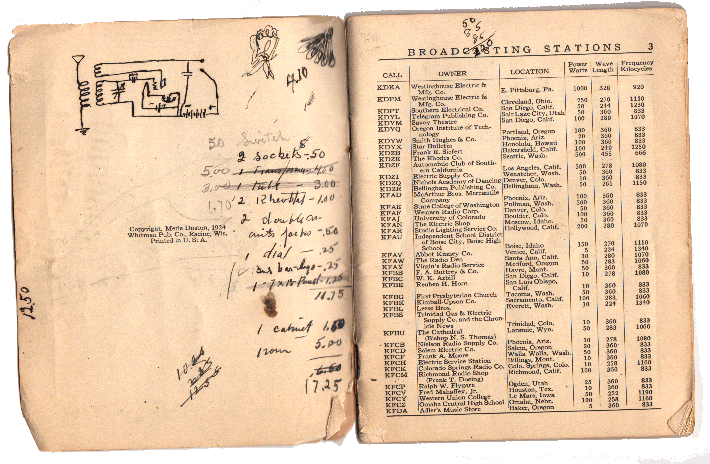
R.C and his mother, Auretta Risley

R.C. Risley’s Radio Log and Call Book
Late in 1924 my father, R.C., began staying up nights alone in his attic bedroom searching the airwaves for radio signals. He was eighteen years old and waiting to begin college.
I would discover this interest in radio only after his death when I found this Radio Log & Call Book which he had kept and carefully saved as a souvenir.
While manufacturers in those years were selling table top and cabinet console models to satisfy the craze created by the novelty of radio, other listeners took to making their own simple receivers. With a piece of lead galena crystal, a cat whisker detector, an empty cardboard Quaker Oats container, some copper wire, and a few other parts, R.C. had built his own. On a blank page in the log book he had sketched the schematic diagram of the radio he assembled. On the same page, he itemized expenditures for parts totaling: $17.25. Curiously, there is no mention of a cash outlay for copper wire.
During the day, he worked in a factory winding copper wires around armatures for small electric motors that powered the bellows of pipe organs or the action of player pianos.
In the evening, after supper he would leave his younger sisters to their homework and retire upstairs. The ‘sferics at night gave the best reception from transmitters the farthest away.
If there was no danger of lightning strikes, he would connect his radio to the 200′ copper wire antenna he had stretched between his window and a nearby tree.
Once the radio had warmed up he would stalk the airwaves. Working the whisker along the copper wire coiled around the Quaker Oats cylinder he would bring in broadcasts from near and far.
In his log book he would record details of the magic he had conjured from the ether. He would fill in the station “call” letters, broadcast frequency, distance from Hope Street, Stamford, Connecticut, and signal strength. Almost as an afterthought he would note the content. The miracle was in the acquisition of the broadcast, not in the programming.
I wish that he had shown me his log book when he could have shared his excitement. Instead, I can only piece together this part of his life times from conversations I overheard others about as I was growing up. But looking at this little booklet I know two things: 1. That copper wire played an important role in his life, and 2. That once upon a time my father was able to tease words and music out of the starry night.

R.C. Risley’s schematic and expenditures for his radio.

Tracking station call letters, signal strength and clarity was more imporant to R.C. than the program itself.